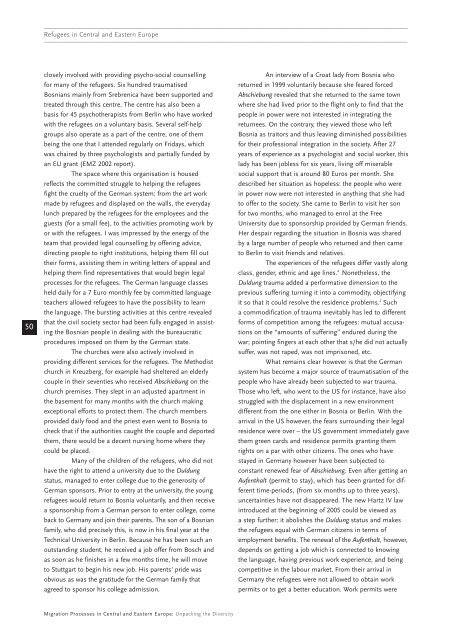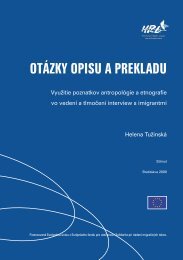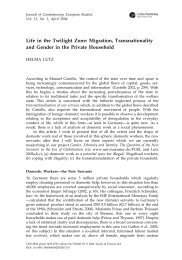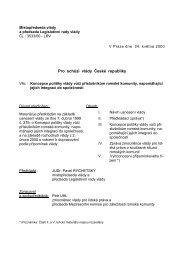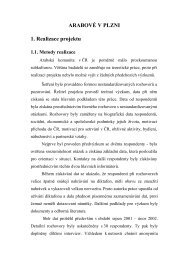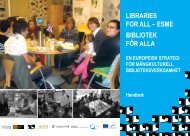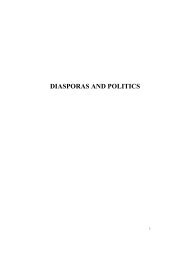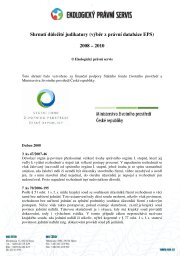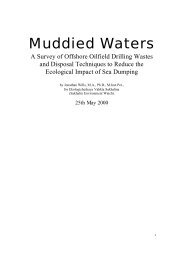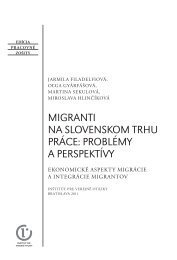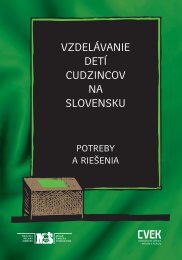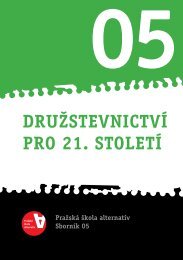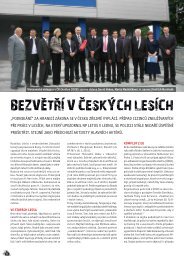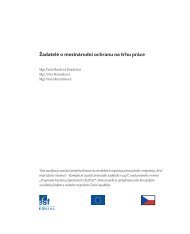Migration Processes in Central and Eastern Europe - Multiple Choices
Migration Processes in Central and Eastern Europe - Multiple Choices
Migration Processes in Central and Eastern Europe - Multiple Choices
Create successful ePaper yourself
Turn your PDF publications into a flip-book with our unique Google optimized e-Paper software.
———————————————————————————————————————————————————————————————<br />
Refugees <strong>in</strong> <strong>Central</strong> <strong>and</strong> <strong>Eastern</strong> <strong>Europe</strong><br />
———————————————————————————————————————————————————————————————<br />
50<br />
closely <strong>in</strong>volved with provid<strong>in</strong>g psycho-social counsell<strong>in</strong>g<br />
for many of the refugees. Six hundred traumatised<br />
Bosnians ma<strong>in</strong>ly from Srebrenica have been supported <strong>and</strong><br />
treated through this centre. The centre has also been a<br />
basis for 45 psychotherapists from Berl<strong>in</strong> who have worked<br />
with the refugees on a voluntary basis. Several self-help<br />
groups also operate as a part of the centre, one of them<br />
be<strong>in</strong>g the one that I attended regularly on Fridays, which<br />
was chaired by three psychologists <strong>and</strong> partially funded by<br />
an EU grant (EMZ 2002 report).<br />
The space where this organisation is housed<br />
reflects the committed struggle to help<strong>in</strong>g the refugees<br />
fight the cruelty of the German system: from the art work<br />
made by refugees <strong>and</strong> displayed on the walls, the everyday<br />
lunch prepared by the refugees for the employees <strong>and</strong> the<br />
guests (for a small fee), to the activities promot<strong>in</strong>g work by<br />
or with the refugees. I was impressed by the energy of the<br />
team that provided legal counsell<strong>in</strong>g by offer<strong>in</strong>g advice,<br />
direct<strong>in</strong>g people to right <strong>in</strong>stitutions, help<strong>in</strong>g them fill out<br />
their forms, assist<strong>in</strong>g them <strong>in</strong> writ<strong>in</strong>g letters of appeal <strong>and</strong><br />
help<strong>in</strong>g them f<strong>in</strong>d representatives that would beg<strong>in</strong> legal<br />
processes for the refugees. The German language classes<br />
held daily for a 7 Euro monthly fee by committed language<br />
teachers allowed refugees to have the possibility to learn<br />
the language. The burst<strong>in</strong>g activities at this centre revealed<br />
that the civil society sector had been fully engaged <strong>in</strong> assist<strong>in</strong>g<br />
the Bosnian people <strong>in</strong> deal<strong>in</strong>g with the bureaucratic<br />
procedures imposed on them by the German state.<br />
The churches were also actively <strong>in</strong>volved <strong>in</strong><br />
provid<strong>in</strong>g different services for the refugees. The Methodist<br />
church <strong>in</strong> Kreuzberg, for example had sheltered an elderly<br />
couple <strong>in</strong> their seventies who received Abschiebung on the<br />
church premises. They slept <strong>in</strong> an adjusted apartment <strong>in</strong><br />
the basement for many months with the church mak<strong>in</strong>g<br />
exceptional efforts to protect them. The church members<br />
provided daily food <strong>and</strong> the priest even went to Bosnia to<br />
check that if the authorities caught the couple <strong>and</strong> deported<br />
them, there would be a decent nurs<strong>in</strong>g home where they<br />
could be placed.<br />
Many of the children of the refugees, who did not<br />
have the right to attend a university due to the Duldung<br />
status, managed to enter college due to the generosity of<br />
German sponsors. Prior to entry at the university, the young<br />
refugees would return to Bosnia voluntarily, <strong>and</strong> then receive<br />
a sponsorship from a German person to enter college, come<br />
back to Germany <strong>and</strong> jo<strong>in</strong> their parents. The son of a Bosnian<br />
family, who did precisely this, is now <strong>in</strong> his f<strong>in</strong>al year at the<br />
Technical University <strong>in</strong> Berl<strong>in</strong>. Because he has been such an<br />
outst<strong>and</strong><strong>in</strong>g student, he received a job offer from Bosch <strong>and</strong><br />
as soon as he f<strong>in</strong>ishes <strong>in</strong> a few months time, he will move<br />
to Stuttgart to beg<strong>in</strong> his new job. His parents' pride was<br />
obvious as was the gratitude for the German family that<br />
agreed to sponsor his college admission.<br />
An <strong>in</strong>terview of a Croat lady from Bosnia who<br />
returned <strong>in</strong> 1999 voluntarily because she feared forced<br />
Abschiebung revealed that she returned to the same town<br />
where she had lived prior to the flight only to f<strong>in</strong>d that the<br />
people <strong>in</strong> power were not <strong>in</strong>terested <strong>in</strong> <strong>in</strong>tegrat<strong>in</strong>g the<br />
returnees. On the contrary, they viewed those who left<br />
Bosnia as traitors <strong>and</strong> thus leav<strong>in</strong>g dim<strong>in</strong>ished possibilities<br />
for their professional <strong>in</strong>tegration <strong>in</strong> the society. After 27<br />
years of experience as a psychologist <strong>and</strong> social worker, this<br />
lady has been jobless for six years, liv<strong>in</strong>g off miserable<br />
social support that is around 80 Euros per month. She<br />
described her situation as hopeless: the people who were<br />
<strong>in</strong> power now were not <strong>in</strong>terested <strong>in</strong> anyth<strong>in</strong>g that she had<br />
to offer to the society. She came to Berl<strong>in</strong> to visit her son<br />
for two months, who managed to enrol at the Free<br />
University due to sponsorship provided by German friends.<br />
Her despair regard<strong>in</strong>g the situation <strong>in</strong> Bosnia was shared<br />
by a large number of people who returned <strong>and</strong> then came<br />
to Berl<strong>in</strong> to visit friends <strong>and</strong> relatives.<br />
The experiences of the refugees differ vastly along<br />
class, gender, ethnic <strong>and</strong> age l<strong>in</strong>es. 4 Nonetheless, the<br />
Duldung trauma added a performative dimension to the<br />
previous suffer<strong>in</strong>g turn<strong>in</strong>g it <strong>in</strong>to a commodity, objectify<strong>in</strong>g<br />
it so that it could resolve the residence problems. 5 Such<br />
a commodification of trauma <strong>in</strong>evitably has led to different<br />
forms of competition among the refugees: mutual accusations<br />
on the “amounts of suffer<strong>in</strong>g” endured dur<strong>in</strong>g the<br />
war; po<strong>in</strong>t<strong>in</strong>g f<strong>in</strong>gers at each other that s/he did not actually<br />
suffer, was not raped, was not imprisoned, etc.<br />
What rema<strong>in</strong>s clear however is that the German<br />
system has become a major source of traumatisation of the<br />
people who have already been subjected to war trauma.<br />
Those who left, who went to the US for <strong>in</strong>stance, have also<br />
struggled with the displacement <strong>in</strong> a new environment<br />
different from the one either <strong>in</strong> Bosnia or Berl<strong>in</strong>. With the<br />
arrival <strong>in</strong> the US however, the fears surround<strong>in</strong>g their legal<br />
residence were over – the US government immediately gave<br />
them green cards <strong>and</strong> residence permits grant<strong>in</strong>g them<br />
rights on a par with other citizens. The ones who have<br />
stayed <strong>in</strong> Germany however have been subjected to<br />
constant renewed fear of Abschiebung. Even after gett<strong>in</strong>g an<br />
Aufenthalt (permit to stay), which has been granted for different<br />
time-periods, (from six months up to three years),<br />
uncerta<strong>in</strong>ties have not disappeared. The new Hartz IV law<br />
<strong>in</strong>troduced at the beg<strong>in</strong>n<strong>in</strong>g of 2005 could be viewed as<br />
a step further: it abolishes the Duldung status <strong>and</strong> makes<br />
the refugees equal with German citizens <strong>in</strong> terms of<br />
employment benefits. The renewal of the Aufenthalt, however,<br />
depends on gett<strong>in</strong>g a job which is connected to know<strong>in</strong>g<br />
the language, hav<strong>in</strong>g previous work experience, <strong>and</strong> be<strong>in</strong>g<br />
competitive <strong>in</strong> the labour market. From their arrival <strong>in</strong><br />
Germany the refugees were not allowed to obta<strong>in</strong> work<br />
permits or to get a better education. Work permits were<br />
<strong>Migration</strong> <strong>Processes</strong> <strong>in</strong> <strong>Central</strong> <strong>and</strong> <strong>Eastern</strong> <strong>Europe</strong>: Unpack<strong>in</strong>g the Diversity


